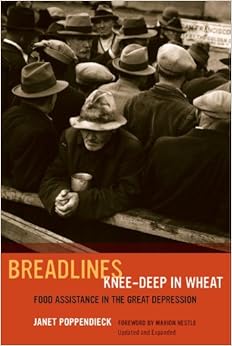Join Health Affairs for a virtual conversation between me and Angela Odoms-Young of Cornell University discussing the evolution of US food and nutrition policy, the current policy landscape, and thoughts on what lies ahead. It’s at 1:00 p.m. EDT. To join the Webinar, register here.
It’s back at last: Breadlines Knee-Deep in Wheat
Janet Poppendieck. Breadlines Knee-Deep in Wheat: Food Assistance in the Great Depression. University of California Press, 2014.

I wrote the Foreword to this updated and expanded edition of Jan Poppendieck’s 1986 classic.
What a gift to have this new edition of Breadlines Knee-Deep in Wheat, too long out of print, and badly missed…Food assistance is what this book is about. Breadlines tells the story of how the U.S. government, confronted with destitution during the Great Depression of the 1930s, first became involved in feeding the hungry.
Government agencies attempted to resolve two pressing social and political problems with one stroke: breadlines, the unemployment-induced poverty that forced great masses of people to line up for handouts of free food, and knee-deep in wheat, shorthand for the great bounty of American agriculture that was available at the time, but unaffordable and allowed to rot or intentionally destroyed.
The solution: distribute surplus commodities to the poor while also—and politically far more important—providing farmers with a paying outlet for what they produced. The earlier chapters of Breadlines focus on the politics—as played out in disputes between members of the Roosevelt administration—that led to a critical shift in the focus of food distribution programs. Once aimed at hunger relief, the programs ended up aimed at protecting the income of farmers.
As a result, the hunger problem remained unsolved…. Breadlines has much to teach us about the historical basis of today’s politics of hunger, welfare, and agriculture policy.
Janet Poppendieck deserves much praise for writing this book and bringing it up to date, and so does University of California Press for producing this most welcome new edition.

